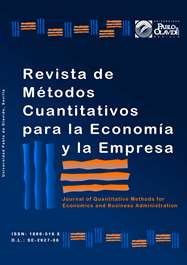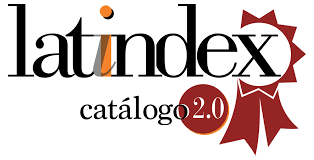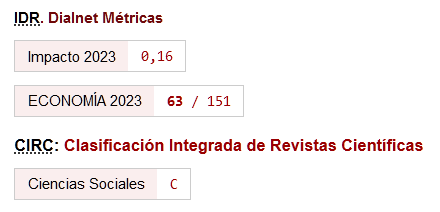Economía artificial: una valoración crítica
DOI:
https://doi.org/10.46661/revmetodoscuanteconempresa.2338Palabras clave:
economía artificial, economía computacional, economía computacional basada en agentes, artificial economics, computational economics, agent-based computational economicsResumen
La economía artificial es uno de los métodos o enfoques de investigación para el estudio de sistemas socioeconómicos complejos con mayor crecimiento durante los últimos años. Este artículo presenta una visión crítica sobre sus características, su potencial y los riesgos relativos al uso de esta metodología. Para ello, encontramos útil relacionar y comparar a la economía artificial con la economía teórica más tradicional. Desde nuestro análisis, la economía teórica y la economía artificial comparten los mismos objetivos, presentan menos diferencias metodológicas de las que a primera vista pudiera parecer, y sus aproximaciones son sin duda complementarias.
Descargas
Citas
Amblard, F. (2010) "Construire des sociétés artificielles pour comprendre les phénomènes sociaux réels," Nouvelles perspectives en sciences sociales: Revue internationale de systémique complexe et d'études relationnelles, 5(2), 69–77.
Amman, H. M., Kendrick, D. A. and Rust, J. (1996) Handbook of Computational Economics, Vol. 1. Amsterdam: Elsevier.
Axelrod, R. (1984) The Evolution of Cooperation, New York: Basic Books.
Axelrod, R. (1997) "Advancing the Art of Simulation in the Social Sciences," in R. Conte, R. Hegselmann and P. Terna (eds.), Simulating Social Phenomena. Springer, pp. 21–40.
Axtell, R. (2000) "Why agents?: On the varied motivations for agent computing in the social sciences," Proceedings of the Workshop on Agent Simulation: Applications, Models and Tools: 3-24. Argonne National Laboratory, IL.
Batten, D. F. (2000) Discovering Artificial Economics: How Agents Learn and Economies Evolve. Boulder, Colorado: Westview Press.
Binmore, K. (1998) "Robert Axelrod - The Complexity of Cooperation (Book review)", Journal of Artificial Societies and Social Simulation, 1(1). Retrieved from http://jasss.soc.surrey.ac.uk/1/1/review1.html
Binmore, K. (2011) Rational Decisions. Princeton University Press.
Chen, S.-H., Jain, L. and Tai, C.-C. (2006) Computational Economics: A Perspective from Computational Intelligence. Idea Group Publishing.
Cioffi-Revilla, C. (2010) "A methodology for complex social simulations", Journal of Artificial Societies and Social Simulation, 13(1), 7. Retrieved from http://jasss.soc.surrey.ac.uk/13/1/7.html
Colman, A. M. (1995) Game Theory and its Applications: In the Social and Biological Sciences, 2nd edition. Routledge.
Czerwiński, Z. (1958) "On the relation of statistical inference to traditional induction and deduction", Studia Logica, 7(1), 243–264.
Edmonds, B. (2007) "The practical modelling of context-dependent causal processes – A recasting of Robert Rosen’s thought", Chemistry & Biodiversity, 4(10), 2386–2395.
Edmonds, B. (2011) "Context in social simulation: why it can’t be wished away", Computational and Mathematical Organization Theory, 18(1), 5–21.
Epstein, J.M. (2006) "Remarks on the Foundations of Agent-Based Generative Social Science," in L. Tesfatsion and K.L. Judd (eds.), Handbook of Computational Economics, Vol. 2, pp. 1585–1604.
Epstein, J.M. (2006) Generative Social Science: Studies in Agent-Based Computational Modeling, STU - Stud. Princeton University Press.
Galán, J.M., Izquierdo, L.R., Izquierdo, S.S., Santos, J.I., Olmo, R. del, López-Paredes, A. and Edmonds, B. (2009) "Errors and Artefacts in Agent-Based Modelling", Journal of Artificial Societies and Social Simulation, 12(1), 1. Retrieved from http://jasss.soc.surrey.ac.uk/12/1/1.html
Gintis, H. (2014) The Bounds of Reason: Game Theory and the Unification of the Behavioral Sciences Revised edition. Princeton University Press.
Gotts, N.M., Polhill, J.G. and Law, A.N. R. (2003). "Agent-Based Simulation in the Study of Social Dilemmas", Artificial Intelligence Review, 19(1), 3–92.
Hassan, S., Arroyo, J., Galán, J.M., Antunes, L. and Pavón, J. (2013) "Asking the Oracle: Introducing Forecasting Principles into Agent-Based Modelling", Journal of Artificial Societies and Social Simulation, 16(3), 13. Retrieved from http://jasss.soc.surrey.ac.uk/16/3/13.html
Izquierdo, L.R., Izquierdo, S.S., Galán, J.M. and Santos, J.I. (2009) "Techniques to Understand Computer Simulations: Markov Chain Analysis", Journal of Artificial Societies and Social Simulation, 12(1), 6. Retrieved from http://jasss.soc.surrey.ac.uk/12/1/6.html
Izquierdo, L.R., Izquierdo, S.S., Galán, J.M. and Santos, J.I. (2013) "Combining Mathematical and Simulation Approaches to Understand the Dynamics of Computer Models," in B. Edmonds and R. Meyer (eds.), Simulating Social Complexity. Berlin, Heidelberg: Springer, pp. 235–271.
Izquierdo, S.S. and Izquierdo, L.R. (2013) "Stochastic Approximation to Understand Simple Simulation Models", Journal of Statistical Physics, 151(1-2), 254–276.
Izquierdo, L.R. and Polhill, J.G. (2006) "Is Your Model Susceptible to Floating-Point Errors?", Journal of Artificial Societies and Social Simulation, 9(4), 4. Retrieved from http://jasss.soc.surrey.ac.uk/9/4/4.html
Jackson, M.O. (2010) Social and Economic Networks. Princeton University Press.
Kendrick, D.A. and Amman, H.M. (1999) "Programming Languages in Economics", Computational Economics, 14(1/2), 151–181.
Keynes, J.M. (1936) The General Theory of Employment, Interest and Money. London: Macmillan.
Kulkarni, V.G. (2009) Modeling and Analysis of Stochastic Systems, 2nd edition. Chapman & Hall/CRC Texts in Statistical Science.
Kushner, H.J. and Yin, G.G. (1997) Stochastic Approximation Algorithms and Applications. New York, NY: Springer.
Leombruni, R. and Richiardi, M. (2005) "Why are economists sceptical about agent-based simulations?", Physica A: Statistical Mechanics and its Applications, 355(1), 103–109.
Mendelson, E. (1997) Introduction to Mathematical Logic, 4th edition. CRC Press.
Newman, M. (2010) Networks. An Introduction. Oxford University Press.
Polhill, J.G., Izquierdo, L.R. and Gotts, N.M. (2006) "What every agent-based modeller should know about floating point arithmetic", Environmental Modelling & Software, 21(3), 283–309.
Putnam, H. (1975) "What is mathematical truth?", Historia Mathematica, 2(4), 529–533.
Richiardi, M. G. (2012) "Agent-based computational economics: a short introduction", The Knowledge Engineering Review, 27(02), 137–149.
Richiardi, M., Leombruni, R., Saam, N. and Sonnessa, M. (2006) "A Common Protocol for Agent-Based Social Simulation", Journal of Artificial Societies and Social Simulation, 9(1), 15. Retrieved from http://jasss.soc.surrey.ac.uk/9/1/15.html
Rosen, R. (2012) Anticipatory Systems: Philosophical, Mathematical, and Methodological Foundations, 2nd edition. New York, NY: Springer.
Sakoda, J.M. (1971) "The checkerboard model of social interaction," The Journal of Mathematical Sociology, 1(1), 119–132.
Sandholm, W.H. (2010) Population Games and Evolutionary Dynamics. The MIT Press.
Schelling, T.C. (1971) "Dynamic models of segregation", The Journal of Mathematical Sociology, 1(2), 143–186.
Schmedders, K. and Judd, K.L. (2014) Handbook of Computational Economics, Vol. 3. Amsterdam: North Holland.
Squazzoni, F. (2010) "The impact of agent-based models in the social sciences after 15 years of incursions", History of Economic Ideas, 18(2), 197–233.
Tesfatsion, L. (2002) "Agent-based computational economics: growing economies from the bottom up", Artificial Life, 8(1), 55–82.
Tesfatsion, L. (2003) "Agent-based computational economics: modeling economies as complex adaptive systems", Information Sciences, 149(4), 262–268.
Tesfatsion, L. (2006) "Agent-Based Computational Economics: A Constructive Approach to Economic Theory", in L. Tesfatsion and K.L. Judd (eds.), Handbook of Computational Economics, Vol. 2, pp. 831–880.
Tesfatsion, L. and Judd, K.L. (2006) Handbook of Computational Economics, Vol. 2: Agent-Based Computational Economics. Amsterdam: Elsevier.
Troitzsch, K.G. (2009) "Not All Explanations Predict Satisfactorily, and Not All Good Predictions Explain", Journal of Artificial Societies and Social Simulation, 12(1), 10. Retrieved from http://jasss.soc.surrey.ac.uk/12/1/10.html
Vega-Redondo, F. (2003) Economics and the Theory of Games. Cambridge University Press.
Weibull, J.W. (1995) Evolutionary Game Theory. The MIT Press.
Descargas
Publicado
Cómo citar
Número
Sección
Licencia
Derechos de autor 2016 Revista de Métodos Cuantitativos para la Economía y la Empresa

Esta obra está bajo una licencia internacional Creative Commons Atribución-CompartirIgual 4.0.
El envío de un manuscrito a la Revista supone que el trabajo no ha sido publicado anteriormente (excepto en la forma de un abstract o como parte de una tesis), que no está bajo consideración para su publicación en ninguna otra revista o editorial y que, en caso de aceptación, los autores están conforme con la transferencia automática del copyright a la Revista para su publicación y difusión. Los autores retendrán los derechos de autor para usar y compartir su artículo con un uso personal, institucional o con fines docentes; igualmente retiene los derechos de patente, de marca registrada (en caso de que sean aplicables) o derechos morales de autor (incluyendo los datos de investigación).
Los artículos publicados en la Revista están sujetos a la licencia Creative Commons CC-BY-SA de tipo Reconocimiento-CompartirIgual. Se permite el uso comercial de la obra, reconociendo su autoría, y de las posibles obras derivadas, la distribución de las cuales se debe hacer con una licencia igual a la que regula la obra original.
Hasta el volumen 21 se ha estado empleando la versión de licencia CC-BY-SA 3.0 ES y se ha comenzado a usar la versión CC-BY-SA 4.0 desde el volumen 22.










